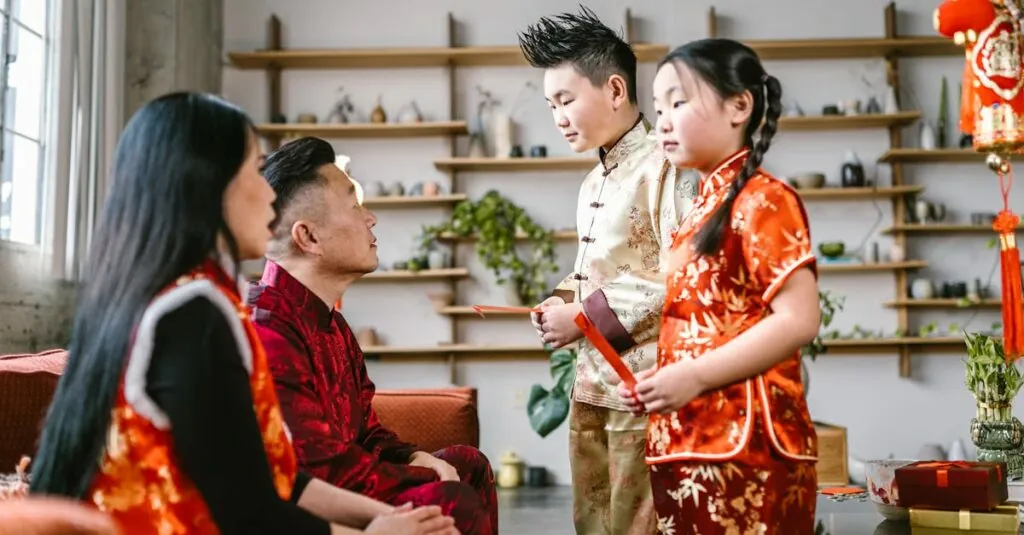Family culture and traditions are the secret sauce that flavors every gathering, from holiday feasts to Sunday dinners. They’re the quirky rituals that make a family unique, like Grandma’s legendary casserole or that annual game of charades that inevitably ends in laughter—and probably a few eye rolls. These traditions not only strengthen bonds but also create lasting memories that can be cherished for generations.
In a world that often feels chaotic, embracing family culture provides a comforting anchor. It’s the glue that holds everyone together, reminding them of their roots and shared experiences. Whether it’s a special recipe passed down through the ages or a hilarious family story that gets retold at every gathering, these traditions shape identities and foster connections. So, let’s dive into the delightful world of family culture and explore how these cherished practices can enrich lives and bring families closer than ever.
Table of Contents
ToggleUnderstanding Family Culture And Traditions
Family culture encompasses the values, beliefs, and practices passed down through generations. It shapes identity and influences interactions.
Definition Of Family Culture
Family culture includes customs, rituals, and practices unique to each family unit. Distinctive aspects like language, cuisine, and celebrations foster connections among members. Traditions emerge from shared experiences and values, reflecting what families prioritize. Every family’s culture manifests in different ways, from communication styles to holiday celebrations, creating a sense of belonging. Recognizing these elements aids in understanding family dynamics.
Importance Of Family Traditions
Family traditions play a significant role in nurturing connections. They create lasting memories and reinforce shared values, enhancing familial bonds. Rituals, such as weekly family dinners or holiday gatherings, encourage reliable interactions. Through these practices, family members cultivate a sense of identity and belonging. Celebrating achievements together or marking life transitions through specific traditions strengthens relationships. Each tradition, no matter how small, contributes to a family’s unique narrative and offers comfort in life’s challenges.
Elements Of Family Culture And Traditions
Family culture and traditions consist of key components that shape familial identity. These elements encompass values, beliefs, rituals, and celebrations unique to each family.
Values And Beliefs
Values guide behaviors and decision-making within families. Common values include respect, hard work, and integrity. Beliefs instill a sense of purpose and can vary significantly across families. For instance, some prioritize education highly, while others emphasize compassion and community service. Families often reinforce these values through storytelling and discussions, ensuring they resonate across generations. These principles create a foundation for relationships, influencing how members interact with each other and the world.
Rituals And Celebrations
Rituals play an essential role in family culture, providing opportunities for connection. Annual traditions, like holiday gatherings, establish a sense of continuity and belonging. Shared meals, such as Sunday dinners, foster open communication and create cherished memories. Celebrations, whether birthdays or cultural events, offer moments to honor family history and achievements. Engaging in these rituals strengthens familial bonds, making members feel valued and connected. Each practice enriches the family’s narrative, contributing to its distinctive identity within the broader community.
The Impact Of Family Culture And Traditions
Family culture and traditions significantly shape individual and collective identities. They influence personal development and emotional health, providing essential context for daily life.
On Individual Identity
Family culture contributes to shaping individual identity, instilling values and beliefs from a young age. Through customs and rituals, children develop a sense of belonging and uniqueness. Shared practices, such as holiday traditions or cultural celebrations, reinforce a cohesive family narrative. Additionally, these elements equip individuals with a framework for navigating social interactions. Recognizing one’s cultural heritage fosters pride and self-awareness. Exploring traditions can help individuals connect with their roots, enhancing lifelong personal growth.
On Emotional Well-Being
Emotional well-being flourishes in families rich with culture and tradition. Regular rituals, like family dinners or weekend outings, foster secure connections among members. Consistent interactions provide stability and comfort during life’s ups and downs. Celebrating milestones together creates shared joy and strengthens emotional ties. Furthermore, engaging in traditions cultivates a supportive environment, reducing feelings of isolation. Families that honor their cultural values often experience higher levels of resilience and emotional security. These practices promote a sense of belonging, which is crucial for maintaining overall happiness and mental health.
Changing Dynamics Of Family Culture And Traditions
Family culture and traditions evolve over time, influenced by various factors. Modern society’s rapid pace alters family interactions and practices.
Modern Influences
Technological advancements impact communication within families. Social media platforms create new ways for families to connect and share experiences. Families often embrace diverse cultural influences, leading to more blended traditions. Urbanization encourages families to adapt customs to suit busy lifestyles. Financial pressures can shift focus away from traditional gatherings, leading to fewer regular family interactions. Parents frequently prioritize enriching their children’s experiences with broad cultural perspectives rather than sticking solely to traditional practices.
Intergenerational Changes
Shifts in values between generations affect family connections. Younger family members may prioritize different aspects of culture than their elders. These generational differences can influence the way traditions are celebrated or maintained. For instance, older generations might value formal rituals, while younger ones prefer more casual gatherings. As families become more diverse, intermarriage often introduces new traditions, enriching the family’s cultural tapestry. These changes foster a blend of practices that reflect contemporary societal values while still honoring heritage.
Family culture and traditions play a crucial role in shaping identities and fostering connections. They create a sense of belonging and continuity that enriches lives. As families navigate the complexities of modern life, adapting and evolving their traditions can lead to new ways of bonding while still honoring their heritage.
Embracing these unique customs not only strengthens familial ties but also nurtures emotional health and resilience. Ultimately, the rituals and values passed down through generations serve as a foundation for personal growth and collective identity, ensuring that families remain a source of support and joy amidst life’s challenges.



